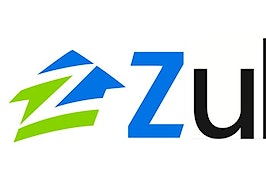As Zillow moves forward on its agreement to acquire archrival Trulia for $3.5 billion in stock, speculation about what changes the merger might bring grows.
The most pressing questions include:
- Will Zillow and Trulia remain content to continue providing leads and lead management tools to agents, or are they out to “disrupt” MLSs, franchisors and brokerages?
- Will “Zulia” use its market power to raise prices?
- Will large franchise brands and brokerages use their clout to negotiate volume-based discounts with the new giant that independents can’t match?
- What does the combination of the two biggest real estate portals portend for the No. 3 listings website, realtor.com?
Despite its clear leadership among national real estate search portals in capturing consumer traffic, Zillow is still beholden to brokers for listings, said Howard “Hoby” Hanna, president of the Midwest region of brokerage giant Howard Hanna Real Estate Services. “Without our listings, they can’t make money.”
That leverage will likely put the brakes on Zillow raising prices too high, Hanna said — a topic of considerable interest since last fall, when Zillow CEO Spencer Rascoff talked about the possibility that agents will someday be willing to pay as much for highly qualified leads as they do for referrals.
“We think that agents will view online impression-based advertising in the same way they have traditionally viewed lead referral economics, which is to say that they’re willing to pay up to 40 percent of their commission to the channel that provides them with a customer,” Rascoff said at the time.
Howard Hanna advertises its listings on both Zillow and realtor.com to place its listing agents exclusively on their listings. Trulia would not remove advertising for services that competed with Howard Hanna’s, so the brokerage opted not to advertise on the portal, Hanna said.
“We can’t allow this consolidation pricing model to increase pricing for brokers and agents,” Hanna said.
“The portals have to remember it’s our listing, it’s our data,” Hanna said. “They’ll have to be careful about how they communicate changes,” he said.
“I think that the potential for increased pricing is there,” said Art Carter, CEO of the California Regional MLS. “Looking at the financial performance of Zillow and Trulia, if they are truly intent on keeping both brands, they’re not cutting much in the way of costs” and therefore seem to be going after “a greater amount of the commission pot.”
You do that by “either increasing pricing or the market share of the advertising dollar out there,” Carter said. “I think that’s got to be the motivating factor. This isn’t an expense-driven merger — this is a revenue-driven merger. This is a smart move if you’re sitting in the Zillow CEO chair.”
Could a merged Zillow and Trulia go further, and disrupt the traditional real estate model?
“If we don’t provide the vision and related tools for our real estate professionals, Zillow will,” said Pacific Union International CEO Mark McLaughlin in an Inman News guest post. McLaughlin noted that Zillow “is holding the equivalent of a franchise-style convention” in Las Vegas this fall for agents who pay to advertise themselves on the site.
Even though technology is changing every day, Hanna said brokers and agents live at the heart of traditional real estate’s value proposition — building relationships, negotiating deals and marketing properties. That’s not going to change.
A spokeswoman for the National Association of Realtors offered a similar assessment. NAR’s consumer website, realtor.com, is operated by Move Inc. and ranks third behind Zillow and Trulia in terms of popularity.
“Realtors are still integral to the process of buying and selling a home,” NAR spokeswoman Sara Wiskerchen said in an emailed statement. “This proposed merger doesn’t change anything about the Realtor value proposition, and NAR remains committed to promoting and supporting the Realtor brand and Realtor value proposition to consumers.”
Joseph Rand, a managing partner of Better Homes and Gardens Rand Realty in New York and New Jersey, thinks of Zillow as an advertising channel.
“A really great one, to be sure. But it’s just an advertising channel,” Rand said in an Inman News guest column. “And unlike newsprint advertising, where you had only one major paper in town, the Internet is lousy right now with startups that are trying to become the Zillow alternative. And all of them are about to move up one slot in the rankings” with the merger of Zillow and Trulia.
Although they make most of their money providing leads to agents and have also gotten into the business of providing tools to manage those leads, Zillow and Trulia have long denied any ambition to “disintermediate” real estate agents. Both companies have been building ties to MLSs, franchisors or brokerages in order to obtain more listing data — “feeds” — directly from the source, rather than relying on third-party companies that syndicate listings data.
This month NAR launched a $35 million “Real People” marketing campaign emphasizing the accuracy and freshness of realtor.com listings and the role of Realtors in buying and selling homes. Realtor.com’s latest ads also trumpet that “Accuracy Matters,” a message that’s intended to make consumers aware that the NAR-endorsed website gets listing feeds directly from most of the nation’s more than 800 MLSs.
In an email to real estate brokerages today, Rascoff acknowledged that the news would “lead to a number of questions. The most important thing I can stress is that this combination of companies sets the stage for us to offer even more real estate tools and services to empower consumers, and thus has the ability to drive even more business to local brokerages and their agents.”
For now, Rascoff said, “It’s business as usual for both companies. Our daily focus and strong commitment to local agents and professionals in the real estate industry remain unchanged and of the utmost importance to our entire team.”
Zillow sent a nearly identical email to “Premier” agents who advertise on the site, and to real estate agents who have set up free accounts with Zillow.
An email to MLSs promised that the merger will make Zillow “a better-resourced collaborator when it comes to meeting your needs and providing innovative partnership opportunities,” and that the company will “work hard to make sure the great partnerships we have with MLSs nationwide continue to prosper.”
Even if the portals have no greater ambition than to sell leads and lead management tools to agent, the merger could have implications for small, independent brokerages, and their ability to compete with bigger companies — particularly those affiliated with big-name franchisors like Coldwell Banker, Century 21, Re/Max and Berkshire Hathaway HomeServices.
Some worry that bigger brokerages and franchisors will redouble their efforts to negotiate advertising perks and volume discounts on “enhanced” listings for their agents that smaller firms can’t compete with. Listing enhancements give brokers and agents greater visibility on search portals, and typically prevent ads for agents at competing firms from showing up alongside listings that they represent.
Century 21 has been subsidizing realtor.com listing enhancements for its brokers and agents since 2009, adding Zillow the following year and Trulia, Homes.com and Homefinder.com by 2011, providing discounts of up to 85 percent.
In June 2011, Realogy subsidiary NRT LLC announced it had signed agreements to add advertising enhancements to 100,000 property listings on Trulia, Zillow, realtor.com and Yahoo Real Estate (now Yahoo Homes).
When Realogy went public in 2012, an investor prospectus noted the company’s “attractive financial arrangements with third-party websites such as Google, Yahoo, Trulia, Zillow and others” that provide “significant” advantages for the companies’ agents and franchisees.
On Saturday, Citron Research published a rate table detailing large discounts NRT agents received from several big portals this spring, thanks to subsidies by NRT. Inman News verified that the information was posted in a report on a Coldwell Banker brokerage website that has since been taken down. NRT’s parent company, Realogy, had no comment on the Zillow-Trulia merger.
In its report, Citron concludes that the discounts demonstrate that Zillow and Trulia have a limited capacity to raise prices. But its unclear how much franchisors and brokerages pay to obtain such discounts for their agents.
(In reports that it began publishing in 2012, Citron Research has relentlessly maintained that shares in Zillow are overvalued. Investors who relied on Citron’s reports to short-sell Zillow at $40 per share when the first report was issued in 2012 or $90 when another report came out last September would be looking at paying $160 per share if they still needed to cover those short positions today.)
Re/Max CEO Margaret Kelly said the franchisor has marketing agreements with both Zillow and Trulia, and views both portals as great marketing partners, not unlike newspapers were before the Internet age.
Consumers will always need high-quality agents and brokers, Kelly said. That’s where Re/Max comes in.
Despite the enormous growth of Zillow’s brand with consumers, Re/Max is not concerned about the firm as a competitor, Kelly said. But the 40-year-old global franchisor is wary of the firm’s possible expansion into the brokerage space. “We’re watching,” she said.
Right now, though, she says she’s excited for Re/Max and the industry to take advantage of Zillow and Trulia’s complementary strengths.
Jim Klinge, who runs a 12-agent independent brokerage in San Diego, says he’s not worried about the special treatment larger firms can negotiate with the large portals.
“It’s not a problem for me and agents like me,” who are experienced and are good at what they do, Klinge said.
Klinge, who said he advertises in a small capacity on Zillow, Trulia and realtor.com, says he uses blogging and YouTube videos to keep his brand and expertise in the forefront of his local market.
“So far I can hang with the big dogs,” he said.
Bulk pricing discounts that the big companies can negotiate are a reality, Klinge said. “It might look unfair, but this is America.”
But Klinge can envision a trend where agents flock to larger firms, attracted by such discounts.
Even so, Klinge would like to see portal consolidation to go a step further. One portal would be better for both the industry and consumers, Klinge said.
“It would be awesome if everyone just laid down their guns and realtor.com joined Zillow, too,” he said. “We’re fighting them and we’re losing.”
The MLS landscape
David Charron, president and CEO of Metropolitan Regional Information Services (MRIS), an MLS serving over 40,000 members in Washington, D.C., and four nearby states, agrees that the Zillow-Trulia merger will help streamline broker and agent ad spending.
“An awful lot of dollars are being spent by agents on both sites,” Charron said. The merger could also help consumers by improving the accuracy and comprehensiveness of the listings on the portals, he said.
Despite these possible perks for the industry and consumers, the deal has the potential to “have significant implications for organized real estate,” Charron said.
The industry typically needs a jolt to make a move, Charron said. The creation of a mega-portal that has a valuation that dwarfs any other firm in the industry might inspire one of those sea-change moments.
For example, the merger might get more brokers behind the secretive listings project that The Realty Alliance, a network of dozens of the U.S.’s largest brokers, is said to be developing, Charron said. The Realty Alliance is reportedly building a listing database for its brokers that will live “upstream” of the MLS and, presumably, national portals.
The deal might also inspire brokers to manage more closely how portals are siphoning off business by offering ancillary services that brokers offer.
“I don’t think I’m troubled by the deal,” Charron said. “I’ll continue to look at Zillow as an advertising platform,” he said. MRIS provides Zillow and Trulia its listings through the syndication platform ListHub on a broker opt-in basis, Charron said.
The creation of a massive national portal also presents an opportunity here for MLSs to partner with local media companies like MRIS has with The Washington Post in its market, Charron said.
“It’s an opportunity to work with an entity that’s in MLSs’ own backyard that are working for relevancy in their industries as well,” Charron said. “It might be a way to regain local market relevance.”
MRIS has relationships with Washington Post writers and management that helps gets the MLS’ story and perspective out there, helping consumers better understand the firm’s value proposition in the real estate space.
In the near and midterm, the deal won’t significantly alter the MLS landscape, Charron said. But longer term, he sees how the merger might lead to a consolidation in the MLS space, to remove the redundant fees (along with inefficiencies) that some brokerages pay whose footprints span multiple MLSs.
“I don’t think (the merger) will affect Houston Association of Realtors’ business model moving forward statewide one bit,” said Danny Frank, who served as chairman of HAR’s board of directors in 2013. HAR.com is a leader in Houston and will grow in prominence as its statewide site that it announced in March becomes established, he said.
“With the statewide launch of har.com … we’re going to fortify our base even more, which will make it even stronger in the eyes of the consumer,” Frank said.
“Now under one brand name I think the (ad prices on Zillow) will go up,” said Frank, who also serves as vice president of sales for Houston-based Coldwell Banker United, Realtors. “Every agent needs to justify for themselves what they are willing to pay for a lead,” he said.
“That’s the $3.5 billion question,” Frank said. “You’re just buying advertising.” People don’t understand that Zillow isn’t a real estate company — it’s an advertising company, he added.
Kipp Cooper, CEO of North Alabama MLS, says that he doesn’t think the coming mega-portal will provide competition for the new public-facing website his MLS is rolling out later this week at valleyMLS.com.
North Alabama negotiated direct-feed agreements with Zillow, Trulia and Homes.com when it rolled out a new syndication platform from Bridge Interactive Group in October. The portals send links back to the MLS’ website as part of those agreements.
“With our link-back agreements with both Zillow and Trulia, we anticipate our valleymls.com traffic to significantly increase to well over 5 million page views per month,” Cooper said.
Agent reactions
Anthony Schippa, a sales associate at Remerica United Realty, thinks that the merger could help “strengthen the opportunity” for Zillow to deal a death blow to MLSs.
Although Zillow has always denied that it has any plans to replace the MLS, the portal’s recent introduction of “coming soon” listings has revived speculation that company leaders might harbor such ambitions.
The only thing that differentiates Zillow from an MLS now is that listing agents don’t have to make offers of compensation to agents who bring buyers to a deal, Schippa said.
Even if Zillow doesn’t want to replace the MLS, the listing portal could still render it irrelevant, said Aldo Figueroa, an agent at Monkton, Maryland-based Riley and Associates Realtors.
“If it becomes an MLS its probably because homeowners start listing their houses there,” Figueroa said. MLSs “are not going to be able to do much about it.”
Geoff Bray, owner of Bray Homes of Wayzata, MN Re/Max Results, agreed.
“If Zillow or Trulia control the listing content, they will control the consumer. If they control the consumer, then the agent needs to figure out how to stay relevant,” Bray said. “Is this finally the tipping point that consumers will have just as much information as the agents?”
Robert Beilenberg, who runs the two-person firm Beilenbarg & Associates with his wife, Jani, in the Denver area, says he suspects that the merger between Zillow and Trulia will lead to an increase in ad prices.
As an advertiser on both Zillow and Trulia, Beilenberg says he received separate emails today from both firms announcing the merger.
“I’m waiting for the other shoe to drop,” Beilenberg said.
If Zillow cranks up ad prices, he says he’ll look to advertise in other places, even those he’s left behind like local newspapers and glossy advertising booklets.
Jennifer Wehner, an agent with Solutions Real Estate in Scottsdale, Arizona, also suspects that the merger between Zillow and Trulia will result in higher advertising prices.
She currently advertises on Zillow, but says if prices go up she will shift more of her ad dollars and energy from buying leads from the portals to building out marketing herself in other arenas like her website and blog.
Inman News reporters Andrea Brambila and Teke Wiggin contributed reporting to this story.







